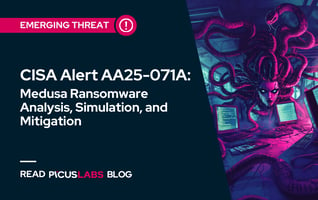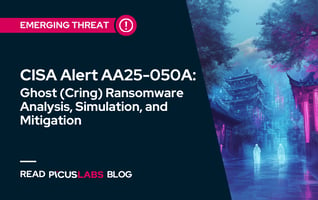BlackCat Ransomware Gang
By Huseyin Can YUCEEL & Picus Labs August 22, 2022 Ransomware
BlackCat ransomware gained its popularity due to its unusual use of Rust programming language. The use of Rust allowed BlackCat ransomware to target multiple operating systems and avoid detection since security controls are not used to analyze malware written in Rust. BlackCat, also known as ALPHV, uses the Ransomware-as-a-Service model and double extortion method. Many threat actors such as FIN12 and DEV-0504 started using BlackCat in their ransomware attacks after Conti, and REvil RaaS group depreciated.
|
Associated Groups |
Aliases - ALPHV, Noberus Successor - BlackMatter and REvil |
|
Associated Country |
Russia |
|
First Seen |
November 2021 |
|
Target Sectors |
Aviation, Construction, Education, Energy, Entertainment, Fashion, Financial Services, Government, Hospitality, Information Technology, Transportation |
|
Target Countries |
United States, Australia, Canada, China, France, Germany, India, Italy, Japan, Romania, Spain, Taiwan, United Kingdom |
|
Business Models |
Ransomware-as-a-service (RaaS) Triple Extortion Initial Access Brokers (IABs) |
|
Extortion Tactics |
File Encryption |
|
Initial Access Methods |
Exploit Public-Facing Application External Remote Services Valid Account |
|
Impact Methods |
Data Encryption Data Exfiltration |
|
Application |
Vulnerability |
CVE |
CVSS |
|
Fortinet FortiGate |
Path Traversal |
9.8 Critical |
|
MITRE ATT&CK Tactic |
Tools |
|
Execution
|
Cobalt Strike PowerShell Windows Task Scheduler |
|
Persistence |
Windows Task Scheduler |
|
Credential Access |
LaZagne Mimikatz |
|
Lateral Movement |
PSExec |
|
Command and Control |
Cobalt Strike Koadic |
|
Exflitration |
ExMatter (Fendr) malware |
|
Impact |
BlackCat Locker malware Vssadmin |
-
[1] K. Arhart, “Cobalt Strike,” Cobalt Strike Research and Development, Aug. 19, 2021. https://www.cobaltstrike.com/ (accessed Jul. 06, 2022).
-
[2] S. Özarslan, “MITRE ATT&CK T1086 PowerShell.” https://www.picussecurity.com/resource/blog/picus-10-critical-mitre-attck-techniques-t1086-powershell (accessed Jul. 06, 2022).
-
[3] “GitHub - EmpireProject/Empire: Empire is a PowerShell and Python post-exploitation agent,” GitHub. https://github.com/EmpireProject/Empire (accessed Jul. 06, 2022).
-
[4] “PsExec - Windows Sysinternals.” https://docs.microsoft.com/en-us/sysinternals/downloads/psexec (accessed Jul. 06, 2022).
-
[5] S. Özarslan, “MITRE ATT&CK T1053 Scheduled Task.” https://www.picussecurity.com/resource/blog/picus-10-critical-mitre-attck-techniques-1053-scheduled-task (accessed Jul. 06, 2022).
-
[6] “GitHub - AlessandroZ/LaZagne: Credentials recovery project,” GitHub. https://github.com/AlessandroZ/LaZagne (accessed Jul. 06, 2022).
-
[7] “GitHub - gentilkiwi/mimikatz: A little tool to play with Windows security,” GitHub. https://github.com/gentilkiwi/mimikatz (accessed Jul. 06, 2022).
-
[8] “zerosum0x0-archive/archive,” GitHub. https://github.com/zerosum0x0-archive/archive (accessed Jul. 06, 2022).
-
[9] F. Fkie, “ExMatter (Malware Family).” https://malpedia.caad.fkie.fraunhofer.de/details/win.exmatter (accessed Jul. 06, 2022).
-
[10] F. Fkie, “BlackCat (Malware Family).” [Online]. Available: https://malpedia.caad.fkie.fraunhofer.de/details/win.blackcat. [Accessed: Aug. 03, 2022]
-
[11] H. C. Yüceel, “MITRE ATT&CK T1490 Inhibit System Recovery - The Ransomware’s Favorite.” https://www.picussecurity.com/resource/mitre-attck-t1490-inhibit-system-recovery-the-ransomwares-favorite (accessed Jul. 06, 2022).








